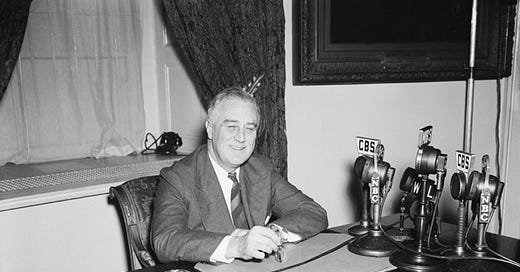March 4, 1933
FDR’s First Inaugural Address
As promised, more good stuff from this timeless speech — this is where he really goes after the bankers — referring to them as the “old order” — and makes clear that his new deal is putting working class and middle class Americans first.
All emphasis mine.
Finally, in our progress toward a resumption of work we require two safeguards against a return of the evils of the old order; there must be a strict supervision of all banking and credits and investments; there must be an end to speculation with other people's money, and there must be provision for an adequate but sound currency.
These are the lines of attack. I shall presently urge upon a new Congress in special session detailed measures for their fulfillment, and I shall seek the immediate assistance of the several States.
Through this program of action we address ourselves to putting our own national house in order and making income balance outgo.
Our international trade relations, though vastly important, are, in point of time and necessity, secondary to the establishment of a sound national economy.
We are still fighting these battles today, partly because the provisions put in place by FDR’s administration were loosened with time.
It’s time to get back to putting the economic welfare of the working and middle class people of this country first.
It’s time to end the “evils of the old order.”
Every day I will endeavor to be as courageous as Franklin D. Roosevelt.
Here’s the video:
Some historic context — The country had been in a brutal economic depression since 1929, with millions out of work. The ruling Republican party took a “laissez faire” approach to the circumstances, leaving many without basic necessities and living in tent cities called “Hoovervilles.”
From Wikipedia: Hoover viewed a lack of confidence in the financial system as the fundamental economic problem facing the nation. He sought to avoid direct federal intervention, believing that the best way to bolster the economy was through the strengthening of businesses such as banks and railroads. He also feared that allowing individuals on the "dole" would permanently weaken the country. Instead, Hoover strongly believed that local governments and private giving should address the needs of individuals.
Over the objection of many economists, Hoover signed the Smoot–Hawley Tariff Act into law in June 1930. Canada, France, and other nations retaliated by raising tariffs, resulting in a contraction of international trade and a worsening of the economy.
By the end of 1930, the national unemployment rate had reached 11.9 percent, but it was not yet clear to most Americans that the economic downturn would be worse than the Depression of 1920–21. A series of bank failures in late 1930 heralded a larger collapse of the economy in 1931. While other countries left the gold standard, Hoover refused to abandon it; he derided any other monetary system as "collectivism".
By mid-1931, the unemployment rate had reached 15 percent, giving rise to growing fears that the country was experiencing a depression far worse than recent economic downturns. A reserved man with a fear of public speaking, Hoover allowed his opponents in the Democratic Party to define him as cold, incompetent, reactionary, and out-of-touch. Hoover's opponents developed defamatory epithets to discredit him, such as "Hooverville" (the shanty towns and homeless encampments), "Hoover leather" (cardboard used to cover holes in the soles of shoes), and "Hoover blanket" (old newspaper used to cover oneself from the cold).
While Hoover continued to resist direct federal relief efforts, Governor Franklin D. Roosevelt of New York launched the Temporary Emergency Relief Administration to provide aid to the unemployed. Democrats positioned the program as a kinder alternative to Hoover's alleged apathy towards the unemployed, despite Hoover's belief that such programs were the responsibility of state and local governments.
Sound familiar? History may not repeat, but it often rhymes.
During the period between the election in November of 1932 and the inauguration in 1933, the economy collapsed even further into depression, with bank runs like you see depicted in It’s a Wonderful Life.
The people had given FDR and the Democrats a wide mandate to make their lives better — with a 60/35 majority in the Senate and a 310/117 majority in the House.
He would use that mandate to change the relationship between Americans and their government forever.
Hey, twenty-first century Democrats — take note.
And when did Inauguration Day change from March to January? From the White House Historical Association:
The Twentieth Amendment, also known as the “lame duck” amendment, was proposed and authored by progressive Nebraska Senator George Norris in 1922. While communications and travel during the late eighteenth and nineteenth centuries were more difficult, necessitating a nearly four-month gap between winning election and taking the Oath of Office, by the twentieth century much had improved in terms of travel and technology, allowing for an earlier Inauguration date. Norris also sought to tackle a larger problem. Previously, a president that lost reelection could govern during the lengthy lame duck session without having to be responsible to voters. Shortening this lame duck period was meant to strengthen democracy and avoid a future Constitutional crisis.
After introducing this legislation five times, Norris was finally successful on his sixth try in March 1932. The Amendment passed Congress and was ratified by the States in January 1933.
Today, presidents serve a four-year term, beginning on January 20 at noon, and ending four years from that date and time exactly.
Through Sunday, I’ll treat you to more amazing prose from FDR’s first inaugural address, because it’s just that good.
On Monday, we’ll move on to his first Fireside Chat.
Be sure to subscribe so you don’t miss your Daily Delano — quotes to inspire you from our 32nd President.
As a public service, The Daily Delano will always remain free to all subscribers — but if you want to support a working gal with a paid subscription, I’m much obliged.



